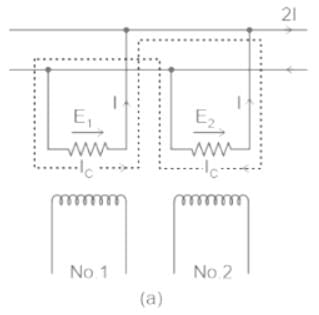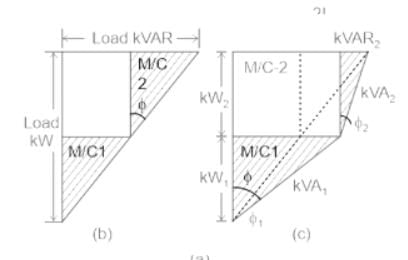Electrical Engineering (EE) Exam > Electrical Engineering (EE) Questions > A change in the excitation of an alternator r...
Start Learning for Free
A change in the excitation of an alternator running in parallel with another alternator:
- a)affects its kW output , kVA output and power factor
- b)affects its kVA output and power factor, but not its kW output
- c)affects its kW output and kVA output, but not its power factor
- d)affects its kW output and power factor, but not its kVA output
Correct answer is option 'B'. Can you explain this answer?
Verified Answer
A change in the excitation of an alternator running in parallel with a...
Effect of Change in Excitation of Alternator:
- A change in the excitation of an alternator running in parallel with others affects only its KVA output it does not affect the KW output.
- A change in the excitation, thus, affects only the power factor of its output.
Explanation:
- Let the initial operating conditions of the two parallel alternators be identical i.e. each alternator supplies equal kW and kVAr of load, thus the operating power factors being equal to the load power factor.
- Now, let the excitation of alternator No. 1 be increased so that excitation emf of alternator 1 (E1) becomes greater than E2.
- The difference between the two EMFs sets up a circulating current (IC)


- As seen, IC is vectorially added to the load current of alternator No. 1 and subtracted from that of No. 2.
- The two machines now deliver load currents I1 and I2 at respective power factors of cos φ1 and cos φ2.
- These changes in load currents lead to changes in power factors, such that cos φ1 is reduced, whereas cos φ2 is increased.
- However, the effect on the kW loading of the two alternators is negligible, but kVAR1 supplied by alternator No. 1 is increased, whereas kVAR2 supplied by alternator No. 2 is correspondingly decreased, as shown by the kVA triangles.


|
Explore Courses for Electrical Engineering (EE) exam
|

|
Question Description
A change in the excitation of an alternator running in parallel with another alternator:a)affects its kW output , kVA output and power factorb)affects its kVA output and power factor, but not its kW outputc)affects its kW output and kVA output, but not its power factord)affects its kW output and power factor, but not its kVA outputCorrect answer is option 'B'. Can you explain this answer? for Electrical Engineering (EE) 2025 is part of Electrical Engineering (EE) preparation. The Question and answers have been prepared according to the Electrical Engineering (EE) exam syllabus. Information about A change in the excitation of an alternator running in parallel with another alternator:a)affects its kW output , kVA output and power factorb)affects its kVA output and power factor, but not its kW outputc)affects its kW output and kVA output, but not its power factord)affects its kW output and power factor, but not its kVA outputCorrect answer is option 'B'. Can you explain this answer? covers all topics & solutions for Electrical Engineering (EE) 2025 Exam. Find important definitions, questions, meanings, examples, exercises and tests below for A change in the excitation of an alternator running in parallel with another alternator:a)affects its kW output , kVA output and power factorb)affects its kVA output and power factor, but not its kW outputc)affects its kW output and kVA output, but not its power factord)affects its kW output and power factor, but not its kVA outputCorrect answer is option 'B'. Can you explain this answer?.
A change in the excitation of an alternator running in parallel with another alternator:a)affects its kW output , kVA output and power factorb)affects its kVA output and power factor, but not its kW outputc)affects its kW output and kVA output, but not its power factord)affects its kW output and power factor, but not its kVA outputCorrect answer is option 'B'. Can you explain this answer? for Electrical Engineering (EE) 2025 is part of Electrical Engineering (EE) preparation. The Question and answers have been prepared according to the Electrical Engineering (EE) exam syllabus. Information about A change in the excitation of an alternator running in parallel with another alternator:a)affects its kW output , kVA output and power factorb)affects its kVA output and power factor, but not its kW outputc)affects its kW output and kVA output, but not its power factord)affects its kW output and power factor, but not its kVA outputCorrect answer is option 'B'. Can you explain this answer? covers all topics & solutions for Electrical Engineering (EE) 2025 Exam. Find important definitions, questions, meanings, examples, exercises and tests below for A change in the excitation of an alternator running in parallel with another alternator:a)affects its kW output , kVA output and power factorb)affects its kVA output and power factor, but not its kW outputc)affects its kW output and kVA output, but not its power factord)affects its kW output and power factor, but not its kVA outputCorrect answer is option 'B'. Can you explain this answer?.
Solutions for A change in the excitation of an alternator running in parallel with another alternator:a)affects its kW output , kVA output and power factorb)affects its kVA output and power factor, but not its kW outputc)affects its kW output and kVA output, but not its power factord)affects its kW output and power factor, but not its kVA outputCorrect answer is option 'B'. Can you explain this answer? in English & in Hindi are available as part of our courses for Electrical Engineering (EE).
Download more important topics, notes, lectures and mock test series for Electrical Engineering (EE) Exam by signing up for free.
Here you can find the meaning of A change in the excitation of an alternator running in parallel with another alternator:a)affects its kW output , kVA output and power factorb)affects its kVA output and power factor, but not its kW outputc)affects its kW output and kVA output, but not its power factord)affects its kW output and power factor, but not its kVA outputCorrect answer is option 'B'. Can you explain this answer? defined & explained in the simplest way possible. Besides giving the explanation of
A change in the excitation of an alternator running in parallel with another alternator:a)affects its kW output , kVA output and power factorb)affects its kVA output and power factor, but not its kW outputc)affects its kW output and kVA output, but not its power factord)affects its kW output and power factor, but not its kVA outputCorrect answer is option 'B'. Can you explain this answer?, a detailed solution for A change in the excitation of an alternator running in parallel with another alternator:a)affects its kW output , kVA output and power factorb)affects its kVA output and power factor, but not its kW outputc)affects its kW output and kVA output, but not its power factord)affects its kW output and power factor, but not its kVA outputCorrect answer is option 'B'. Can you explain this answer? has been provided alongside types of A change in the excitation of an alternator running in parallel with another alternator:a)affects its kW output , kVA output and power factorb)affects its kVA output and power factor, but not its kW outputc)affects its kW output and kVA output, but not its power factord)affects its kW output and power factor, but not its kVA outputCorrect answer is option 'B'. Can you explain this answer? theory, EduRev gives you an
ample number of questions to practice A change in the excitation of an alternator running in parallel with another alternator:a)affects its kW output , kVA output and power factorb)affects its kVA output and power factor, but not its kW outputc)affects its kW output and kVA output, but not its power factord)affects its kW output and power factor, but not its kVA outputCorrect answer is option 'B'. Can you explain this answer? tests, examples and also practice Electrical Engineering (EE) tests.

|
Explore Courses for Electrical Engineering (EE) exam
|

|
Signup for Free!
Signup to see your scores go up within 7 days! Learn & Practice with 1000+ FREE Notes, Videos & Tests.


















